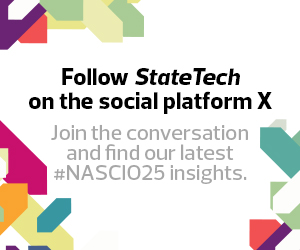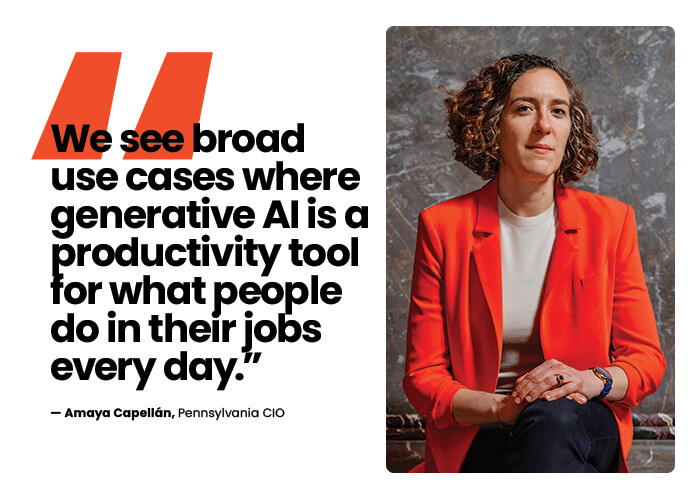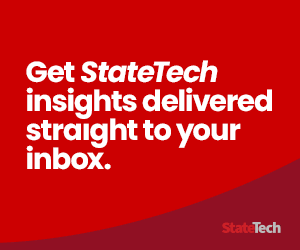In July 2023, Pennsylvania Gov. Josh Shapiro named Amaya Capellán as the latest CIO of the commonwealth. Capellán brought deep experience to the job leading digital transformation in the private sector. She previously worked at Comcast, where she led transformation related to customer experience. With that background, she now eyes how to improve the lives of 13 million Pennsylvania residents. In an interview with StateTech managing editor Mickey McCarter, Capellán discusses how artificial intelligence (AI) is helping to augment the workforce.
Click on the banner below to follow our NASCIO 2025 coverage.
STATETECH: What achievements are you most proud of to date as CIO of Pennsylvania?
Capellán: Gov. Josh Shapiro has placed an explicit focus on delivering human-centered experiences, putting resident services first and foremost. He created the Commonwealth Office of Digital Experience in April 2023, just a few months before I began. With the support of the Governor’s Office and my team, CODE PA has flourished and now includes over 30 people. CODE PA has delivered a lot in its first couple of years. The new PA.gov experience is a big win that we completed in December 2024. We transformed 63 agency websites along with a completely new design system that is founded in customer feedback focus groups and ensures accessibility at every turn. In addition to our accomplishments, we have established strategic priorities for our IT organization. We’ve aligned everyone to the customer focus mission.
Last year, of course, we had a national election. Many eyes were on the commonwealth of Pennsylvania. And we invested a lot of effort and money to really enhance the tools, the processes and the way that people were coming together to support cybersecurity for the commonwealth, especially in the critical election footprint. It was a quiet day on election day, which was the goal.
RELATED: State and local officials identified their top cybersecurity KPIs.
STATETECH: What can you tell us about the use of artificial intelligence in the Pennsylvania government?
Capellán: In Pennsylvania, our embrace of generative AI began with an executive order from our governor in September 2023. With that executive order, we focused on establishing governance and policy with a generative AI governing board. We then committed to learning by doing; we launched a pilot focused on our employees. We believe that generative AI is a powerful tool that can supercharge our employees when used responsibly. So, we seek to balance the risks and impacts of using generative AI. We have a partnership with Carnegie Mellon University, which has been in an advisory role as we proceed.
Our AI pilot has served as the cornerstone of how we’ve been actively engaging with generative AI within the commonwealth. We have learned a lot.
DIVE DEEPER: Build AI readiness around use cases and data.
STATETECH: What are the results of the pilot so far? Can other states learn from what you’re doing?
Capellán: We entered into a pilot agreement with OpenAI to leverage its ChatGPT Enterprise platform. Key to this agreement is that employees can use ChatGPT without their inputs or data being used to train OpenAI’s models. We launched the pilot in March 2024. We started internally by inviting our HR and IT employees. We asked for volunteers; we saw about 15% raise their hands to participate. We saw engagement from folks across different roles and levels of management, union participants, and more.
As we have gone along, we also have extended invitations to new agencies and groups of employees. One big area of focus has been training. Pilot participants received training from our internal teams. OpenAI has held live and virtual workshop sessions. We’ve held weekly employee office hours and periodic seminars on general AI topics for employees. We also established an online community so that we can all talk. There’s a high level of engagement for pilot participants.
We’ve published a first cut of results. The main finding of the pilot is that employees self-reported an average of 105 minutes saved per day on the day they most recently used ChatGPT, which is a staggering result. There are a lot of common use cases for drafting emails and content in various areas, and there have been a couple of targeted use cases that we like to spotlight. Our HR team manages and updates thousands of position descriptions across our commonwealth employee base. HR had a project where they restructured duties for about a dozen of these. A group of HR professionals leveraged ChatGPT to ensure that they could make the updates in an appropriate way. They saved about 30 hours. And so, generative AI has been proven to supercharge our employees. They were able to complete a task in a shorter amount of time. Many of our employees have a backlog of tasks. It’s valuable to have a tool such as ChatGPT to achieve your goals more efficiently.
The governing board meets every month, and it’s the place where we establish generative AI policies and look at results. We have also given the green light to a couple of other activities. We see a lot of promise in legacy modernization. We actively engaged in a modernization project for a human services system. Its code had been written a long time ago, the people who wrote it were long gone, and we had no clear documentation. The team was able to successfully use generative AI to document requirements based on the code in that system, efficiently and effectively. They captured all of the business logic of that system so the team could understand the full scope of what it had and could bake that into a modernized version of the system. Generative AI was a really powerful tool to aid that project and speed things through.
We see broad use cases where generative AI is a productivity tool for what people do in their jobs every day. And we also see niche technical scenarios where it will have a high impact. We believe that the best way to learn is through our employees. And with the appropriate training, guidance and support, they will show us where the value is.
EXPLORE: Here’s what state and local governments need to know about AI PCs.
STATETECH: What's going on with citizen services, digital transformation and legacy modernization?
Capellán: I'll go back to CODE PA and its mighty team of 30. They've been deployed across a lot of key areas, especially aligned to the governor’s priorities. We are focused on enhancing the grants experience from end to end. It’s a major function across so many of our agencies. Individuals and nonprofits and other organizations seek the funding that the state makes available to them, and we may not have helped them find opportunities as much as we can.
SUBSCRIBE: Click the banner to sign up for the StateTech newsletter for weekly updates.
We launched CODE PA to help people. We conducted a bunch of focus groups, bringing in people from those different factions that come to the table seeking grants. Through that process, we were able to isolate the biggest problem spots. The team confirmed that grant discovery was a challenge for people. Many people work with third-party individuals that they pay to aid in that process. And so, we found that people benefit from a searchable database, where you can find different opportunities and understand what kind of information you must submit to qualify for the grant. In October, we launched a grant discovery tool on our new PA.gov website. That’s a huge step forward in the grants experience.
At the end of the day, a lot of the interactions that residents and businesses have with government are through some type of form, where you’re sharing information. That information is routed to the right individuals for review and approval. We’ve launched an initiative called Forms That Suck Less. The name definitely elicits a smile, but it also speaks to a pattern we see in so many of our systems. We can learn what works, and we can create a system that makes those forms simple to create and easy to use, and they’ll deliver the data in the right way. That can be very powerful and create a lot of change. We’re chipping away one form at a time and creating toolkits that folks can leverage to deliver better experiences at scale.
STATETECH: What do you hope to share at the NASCIO Midyear conference?
Capellán: Many of us are passionate about procurement. We are right on the heels of our latest customer service survey, and our agencies continue to struggle with long lead times. We hope to acquire the tools and green-light the projects to help agencies function for many years to come. We’re trying to streamline, simplify and help our agency partners get to the outcomes they need much faster. Procurement is a huge part of that.
We can introduce human-centered design into the process to help keep people from having to jump through hoops and just proceed through a process where we do the checks and balances we need. We are all working in our different ways to address that, and I’d love to talk more about it. I also expect to have many conversations about AI. Every time we turn around, there’s another massive story that breaks about how this technology is impacting our day-to-day lives.
Keep this page bookmarked for our coverage of the NASCIO 2025 Midyear conference. Follow us on X, formerly known as Twitter, at @StateTech and the official conference account, @NASCIO. Join the conversation using the hashtag #NASCIO25.














